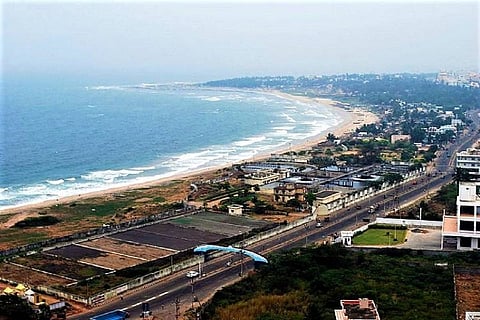

Activists in Andhra Pradesh’s Visakhapatnam have expressed their opposition towards the state government's move to auction off prime land in the city near Beach Road, which was earlier allotted to UAE-based Lulu Group.
Lulu Group had planned to develop an international shopping mall and convention centre across 13.83 acres of land. However, in October last year, the YS Jagan Mohan Reddy government cancelled the land allotted for the Rs 2,200 crore project, stating that it was given at a price much lower than the market rate.
While the activists had welcomed the move at the time, since then, the Andhra Pradesh government has decided to auction off the land, along with other land parcels identified in Visakhapatnam and Guntur districts. This, activists say, is not a wise move.
In total, the state government is selling three stretches of government land in Guntur and six stretches in Visakhapatnam by putting them up for auction later in June. Additionally another 11 parcels of land have been identified to be 'monetised' for the government to raise funds.
This includes the land that was earlier allotted to the Lulu Group, which sits on prime beach facing land near the RK Beach in the city.
Since the bifurcation of Andhra Pradesh in 2014, the state has faced a financial crunch. While Hyderabad is a common capital for 10 years as per the AP Reorganisation Act, infrastructure in the residual state is low. The COVID-19 lockdown is said to have worsened the financial condition of the state.
In his letter to Chief Secretary Nilam Sawhney, retired bureaucrat EAS Sarma pointed to the Government Order (GO) issued by the state in 2012, which said that, "Allotment of land has been used in recent years for resource mobilisation through sale and auction of government lands. The collective result is the rapid depletion, alienation of a scarce natural resource, adversely affecting the future needs of the community."
"Contrary to this (GO), I find that the state government has issued several orders proposing to auction government lands in parcels specifically to raise resources for the state," Sarma said.
He also raised other points, while asking the government to reconsider its move. EAS Sharma, in his letter pointed out that although the government owns vast tracts of land in most towns and cities in the state, the value for government land is bound to appreciate due to the fast-paced urbanisation and by auctioning off prime land to private players, the government would not be able to utilise this land for the needs of the community at large.
"The demand for land for public amenities in urban agglomerations is increasing in leaps and bounds as the state is obligated under the Constitution to provide basic amenities to the people. At present, the local authorities and the state government agencies are not fully discharging those obligations as they should. If they decided to meet those obligations fully, they would need large parcels of government land for the purpose," he added.
EAS Sarma stated that this would include public space for parks, cremation grounds, community halls and night shelters for the homeless, for which the land could be utilised. He also stated that by auctioning off the land, the government is playing into the hands of vested interests to grab these plots of prime property.
"It will not serve the public interest in the long run for the government to alienate its own lands to private individuals and institutions, when its own land requirements stand unfulfilled. Many real estate developers are waiting to grab these plots and, I am afraid, that the government is playing into their hands," Sarma wrote.
He further stated that auctioning government land is a “soft approach” to raising funds at a time when the state is severely short on funds. He suggested that the state government instead impose heavy penalties on encroachers.
"Selling public lands for raising resources is a soft option that will provide an alibi to the present govt for not taking other measures to minimise unproductive and wasteful expenditure and raise resources through more innovative means from those who can afford to provide such resources. For example, the state can levy a high penalty on influential encroachers of public land, impose a deterrent penalty on violators of the environment laws and so on."
Stating that in an earlier letter, he had pointed out that the state government held such lands "merely as a trustee on behalf of the public," he said that he would move court and seek judicial intervention if the state government went ahead with its plans.
Sohan Hatangad, a city-based historian, says that the move would lead to a chaotic buildup of the area, influx of commercial traffic and reduction of lung space. “Once handed out for commercial use, the land, which is a finite common asset, is lost to the citizens forever. I was happy when Jagan cancelled the Lulu deal. It would have been disastrous for local residents. It can be used as a public green space with intense big tree planting and some limited small commerce use. Parking for a few vehicles can be arranged and cycling can be encouraged. Wheelchair friendly pathways can also be built," he added.
Opposition parties have also opposed the move of the state government.
In May, the Bharatiya Janata Party (BJP) and its ally, the Jana Sena Party (JSP) led by actor-politician Pawan Kalyan, launched a campaign dubbed 'Vizag not for sale'.
As part of the campaign, boards were erected across various areas with the slogan. The parties argued that there were other means to raise funds and opposed the state's move to sell property in prime areas, especially during the coronavirus pandemic, when market rates were lower than usual.